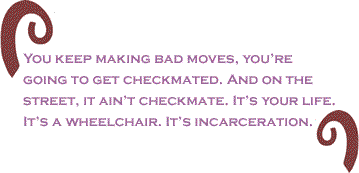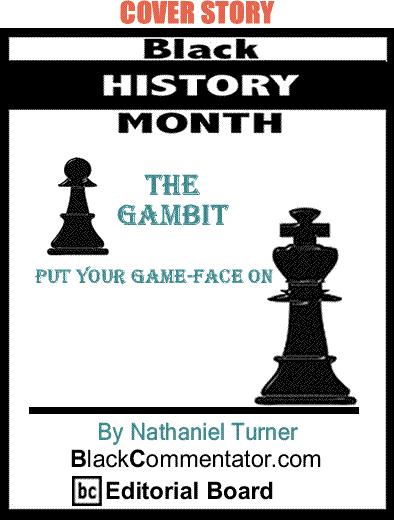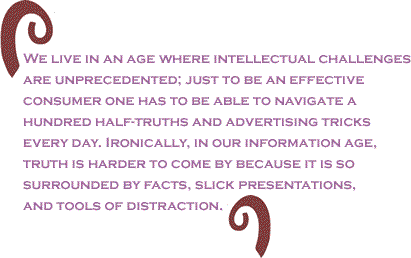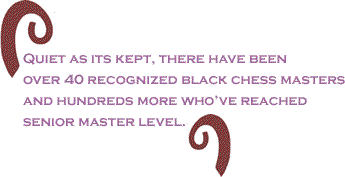
|
||||||||||||||||||||||
|
||||
 |
||||
| Buried in the annals of Black History is a game that may help alleviate the education crisis troubling Black America today. You�re familiar with the grim statistics. While nationwide the so-called �achievement gap� has narrowed at both the fourth- and eighth-grade level in mathematics and reading, white students still score, on average, at least 26 points higher than black students in each subject. About half of all African-American students never graduate from high school. Of the 120,000 or so black students enrolled in college only about half graduate within six years. And still, I�m talking about a game. Or rather, upping our game. No, not basketball, which has given us some outstanding black role models like Bill Russell and Kareem Abdul Jabaar. Not boxing, which blessed us with Muhammed Ali. Not football, which has provided us with the likes of Jim Brown. Not baseball either. Reach even further back than Jackie Robinson or Satchel Paige and the Negro Leagues. In fact, get the idea of athletic achievement out of your mind altogether. Go
back to 1813 - 50 years before the Emancipation Proclamation - to
the birth of James
McCune Smith, the son of an enslaved mother who grew up to be
a distinguished medical doctor, author and activist. Not allowed
to attend college The game of his affection? Chess! That�s right, chess. And ever since McCune, the ancient Persian war game has been calling for educators of African-American students to take notice. The call was heard by Theophilus Thompson, born in 1855, a child of slaves, who grew up to publish a book of chess problems. Cascading down the generations, the call has been heard by Walt Harris, Ken Clayton, Frank Street , 10-year-old chess prodigy K.K. Karanja, and Baraka Shabazz, the only black female to have ever been rated expert by the U.S. Chess Federation, on down to contemporary chess masters Maurice Ashley and Emory Tate. Quiet as its kept, there have been over 40 recognized black chess masters and hundreds more who�ve reached senior master level.
And the call continues to reverberate across Black America, to the point of creating a subculture, so that we can now speak of a �cradle of black chess� in Washington D.C. (And don�t sleep on New York City, Philadelphia or the Bay Area). �Chess is the gymnasium of the mind� - Blaise Pascal Recognition
of the game�s value as an educational aid and self-improvement tool
is well documented. David Shenk, in his book The
Immortal Game: A History of Chess �There�s three phases to a chess game,� Brown told an ABC interviewer, �the opening, the middle and the end, and you have to put them together to win. You don�t win in the opening. That�s what I was trying to do when I went into that bank. I was trying to win in the opening. I was trying to get instant results...You keep making bad moves, you�re going to get checkmated. And on the street, it ain�t checkmate. It�s your life. It�s a wheelchair. It�s incarceration.� Shenk also highlights the Toronto-based Chess�n Math program and the New York-based Chess-in-the-Schools foundation, where he discovered that �chess literacy was like its own unique language: anyone could learn it, but the very youngest players could hardwire it directly into their brains.� And there�s research to back Shenk up. �Chess can enhance concentration, patience, and perseverance,� concludes a University of Sydney study on the connection between chess and math. A Memphis State University researcher investigated the cognitive functions involved in playing chess and concluded that chess can help kids focus on learning for longer periods of time, increase students� learning efficiency as well as their sense of self-perception. All of that made Shenk realize that chess is a tool that can help develop our minds to deal with the challenges of a complex world. �We face in our modern, splintered world not only a crisis in education, but more pointedly a crisis of understanding - of thought and of willingness to engage in thought. We live in an age where intellectual challenges are unprecedented; just to be an effective consumer one has to be able to navigate a hundred half-truths and advertising tricks every day. Ironically, in our information age, truth is harder to come by because it is so surrounded by facts, slick presentations, and tools of distraction.� Sadly, Shenk observes, a common response to this divided, illusory world we find ourselves in is that instead of exercising critical-thinking faculties, people �fall back on a fixed set of beliefs, a strict ideology,� which has left us with �a growing schism between enlightened, skeptical, thinking individuals and close-minded, fundamentalist ideologues.� If we are going to mount a counter attack, �we will need powerful thought tools like chess that help our minds expand, grow comfortable with abstraction, and learn to navigate complex systems.� �It is not enough to be a good player...you must also play well� - Siegbert Tarrasch You don�t have to tell any of this to Freeman Hrabowski. Raised in Birmingham, Alabama, as a black kid with a funny sounding last name, Hrabowski got his PhD when he was just 24. He went on to become president of the University of Maryland at Baltimore. In 2002, Fast Company magazine took notice of his leadership at UMBC, where he was �nurturing a new generation of world-class scientists and mathematicians, the majority of whom are African-American.� Hrabowski, who the Obama administration considered for its Secretary of Education, recruits top high-school students from across the country to attend UMBC as part of the school�s Meyerhoff Scholarship Program. Ninety percent of Meyerhoff students graduate in math, engineering, or the sciences, and 90 percent of those students go on to graduate school.
His vision is simple: �When most people see young black men walking across a campus they think, �There goes the basketball team.� We want them to think, �There goes the chemistry honors society.�� Brother Hrabowski said: damn a football team. Instead, UMBC�s pride and glory is it�s chess team, which has dominated the NCAA championships over the last decade. And they back that up with scholarship dollars, offering four-year Chess Scholarships, plus room and board, if you�re selected as a Chess-Player Scholar.
OK, so it may be overstating it a bit to say chess is a game that may help alleviate the education crisis troubling Black America today. But it can�t hurt to celebrate this new hero emerging out of communities of color across the country - the black chess master; a strategic thinker who can serve as a potent alternative to the drug dealer/rapper/basketball player ideal that holds the imagination of far too many of our youth. BlackCommentator.com Editorial Board member Nathaniel Turner is a pseudonym for a Gen X writer, newspaper editor and activist. He is a news analyst who offers commentaries on contemporary issues facing the progressive movements in the USA Click here to contact brother Turner. |
||||
 |
||||
If you would like to comment on this article, please do so below. There is a 400 character limit. You do not need a FaceBook account. Your comment will be posted here on BC instantly. Thanks. Entering your email address is not mandatory. You may also choose to enter only your first name and your location.
|
||||
Thank you very much for your readership. |
||||
| Any BlackCommentator.com article may be re-printed so long as it is re-printed in its entirety and full credit given to the author and www.BlackCommentator.com. If the re-print is on the Internet we additionally request a link back to the original piece on our Website. | ||||
| |
||||
Issue 362 |
| Executive Editor: Bill Fletcher, Jr. |
| Managing Editor: Nancy Littlefield |
| Publisher: Peter Gamble |
| Est. April 5, 2002 |
| Printer Friendly Version in resizeable plain text format |
 |
 |
 |

|
 |
| |
| |













































